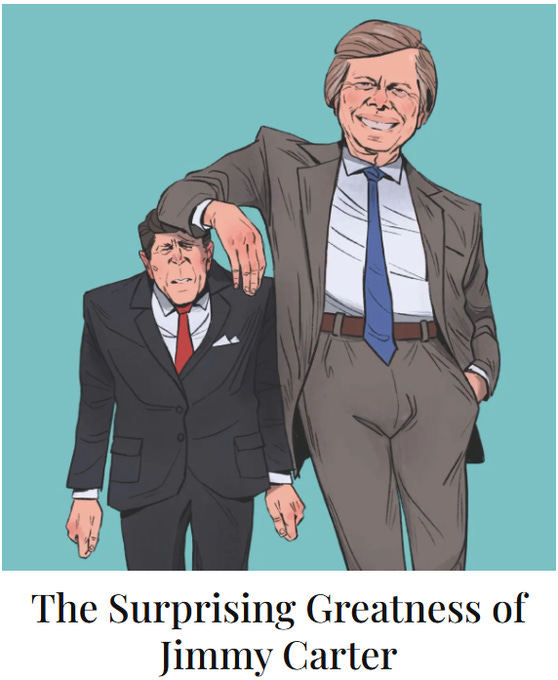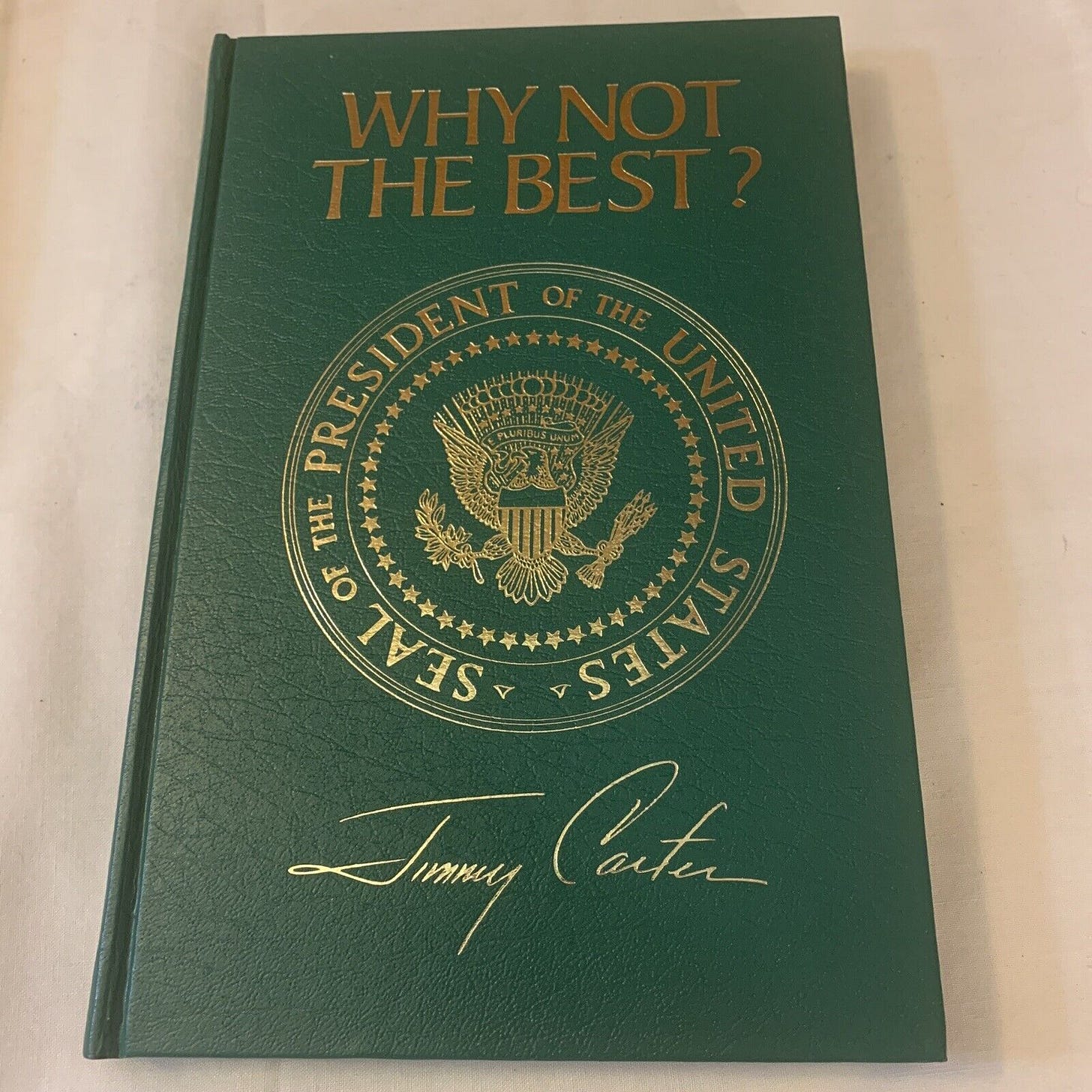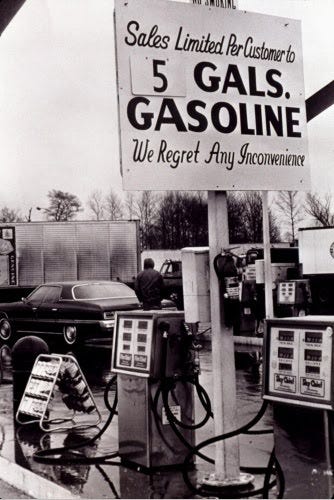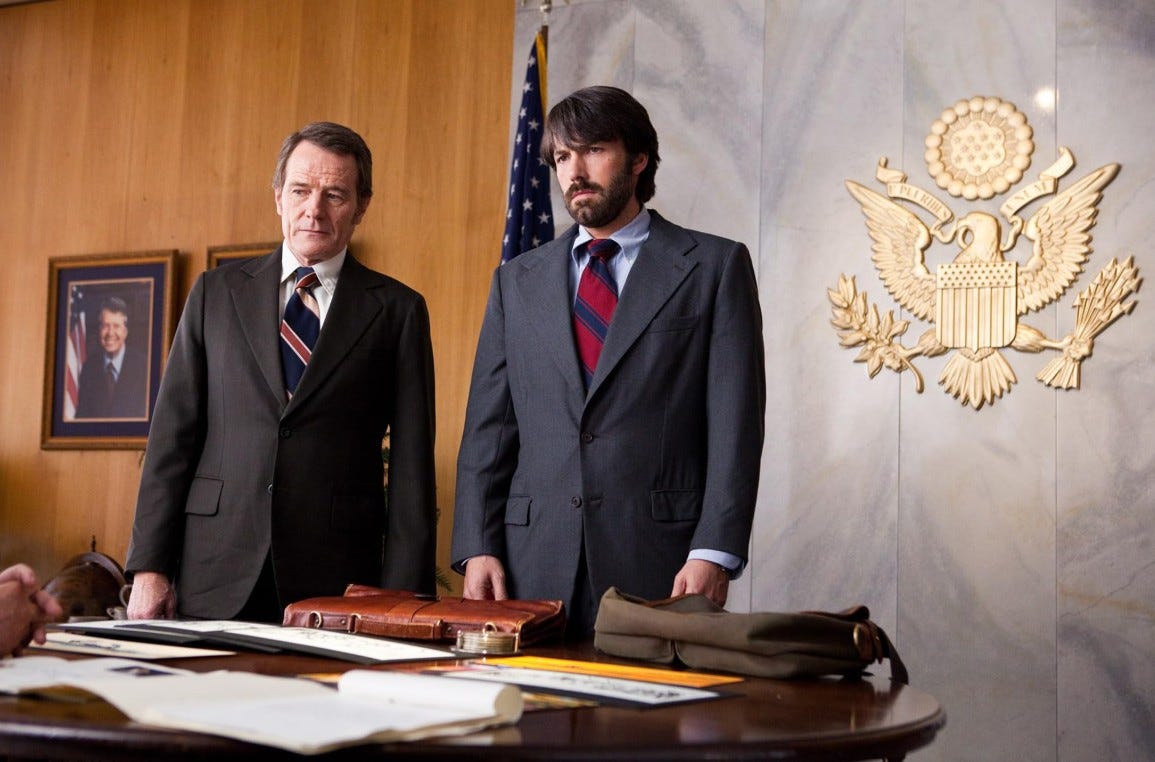Jimmy Carter Retires the "Trophy"
The anti-Israel one-term president retires the trophy as America's worst president, despite notable achievements. His legacy is making Ronald Reagan's presidency possible.
Learning of Jimmy Carter’s passing at age 100 brought back memories. Much ink is being spilled on his life and legacy, much of it qualifying as gaslighting and attempts to rewrite history for partisan political purposes. Like this, from the iconoclastic, far-left Washington Monthly. I couldn’t help but laugh.
For those of us who came of age during the Carter years, including his victorious 1976 presidential campaign, much of it was a response to the Nixon presidency, especially the Watergate scandal.
My college years spanned, almost to the day, the presidency of Carter’s predecessor, Gerald Ford. The Watergate scandal gripped my attention during my final high school days and the summer leading up to my freshman year of college as I traversed Canada as a Civil Air Patrol cadet officer.
My first major political assignment as a news reporter (and still an undergraduate) in 1976 was a campaign visit by President Ford to nearby Lawton, Oklahoma, complete with a press pass. Ford lost, of course, but narrowly carried Oklahoma, one of two “southern” states along with Virginia.
A couple of years later, I was promoted to editor of the Henryetta Daily Freelance with a front-row media seat during the Carter mid-term election of 1978, but not before bolting the news business to be a campaign press secretary for a Republican congressional candidate, Gary Richardson (R-OK). Afterward, I moved to the nation’s capital as a Capitol Hill aide to the late John Paul Hammerschmidt (R-AR). I won another front-row seat to the final two Carter years and the contentious GOP presidential primary leading up to Ronald Reagan’s historic landslide.
I vividly remember that Carter and his campaign mostly feared US Senator Howard Baker (R-TN), or former CIA Director and Congressman George H. W. Bush (R-TX) as his general election opponents. US Sen. Bob Dole (R-KS) was also running. Carter wanted to face Reagan but should have been careful what he wished for. Interestingly, polls showed the race practically tied until the weekend before election day, when Reagan powerfully and successfully framed the contest in his closing final debate comments.
Jimmy Carter’s greatest legacy may be making Ronald Reagan’s presidency possible.
Here’s what I remember of Carter’s presidency.
“Why Not the Best?”
I was consumed by presidential candidate biographies published during the campaigns. It seems almost every candidate published one. Most are not very good, but Carter’s was better than most. I recall vividly how he came across the title, based on his interview with the famous founder of the US nuclear submarine program, Admiral Hyman Rickover. Carter was accepted into the program, but not after Rickover asked Carter if he’d always done his best. No, Carter replied. “Why not the best?” the demanding Rickover asked. Carter served admirably.
That fall, I cast my first presidential ever for Jimmy Carter and his running mate, US Sen. Walter Mondale (D-MN). I’ve never voted for another Democrat since. For anything.
Pardoning Vietnam War Draft Dodgers
Carter’s presidency wasted no time getting off to a rocky start by pardoning Vietnam War draft dodgers on his first full day in office, January 21, 1977. Carter had promised to do so during his presidential campaign. US Sen. Barry Goldwater (R-AZ) called it the most disgraceful thing a president has done. It was seen as a sop to upper middle-class families who could afford to flee to Canada to avoid service that others could not. It remains controversial to this day among a great many Vietnam Veterans who came home to a less-than-enthusiastic welcome.
To be fair, it was not without precedent. President Abraham Lincoln pardoned nearly all Confederate soldiers, and Andrew Johnson followed suit. President Harry Truman pardoned soldiers who refused to serve in WWII. Carter’s pardon did not apply to deserters.
The Iranian Revolution
This event contributed more to Carter's 1980 electoral defeat than any other singular event during his presidency, and plagues us to this day. The cancer-stricken Shah of Iran, Mohammad Reza Pahlavi, fled to Mexico, Panama, and eventually Egypt in the face of an Islamic Revolution that brought back Ayatollah Ruhollah Khomeini from exile. The Shah’s push to secularize, westernize, and urbanize Iran made it prosperous, but caused a backlash among Iranians, who were not only drawn to Khomeini's religious populism but also suffered from high inflation and other economic maladies.
What Carter could do to rescue the Shah, who by 1978 was afflicted and weakened with Leukemia, an enlarged spleen, and poor medical care, is still debated, but the perception grew that Carter was weak and should have done more. The consequences were felt almost immediately, as an Iranian oil embargo led to a repeat of the Arab oil embargo from 1973, complete with shortages, gas lines, and skyrocketing prices.
As a side note, my alma mater, the University of Science and Arts of Oklahoma, was in dire straits in the mid-1970s, with legislative threats to turn the struggling school into a prison. School leaders decided to recruit foreign students—most of them from Iran—to study while paying out-of-state tuition. The Shah was probably happy to rid himself of obnoxious students to colleges overseas. Overnight, nearly 25 percent of our student body were Iranians, almost all males, and they began to conduct local protests against the Shah, whom they felt was spying on and repressing them while schooling in rural Chickasha, Oklahoma, a conservative town of 16,000.
As you might imagine, pickup driving locals didn’t take well to foreigners protesting on their main street.
As the student body president and a local news reporter, I covered the protests while trying to befriend the students. I never found evidence that SAVAK agents (the Shah’s secret police) were on campus, and I saw no evidence of repression. But the paranoia was real, and in retrospect, there probably was an informant or two among the students who might have made life miserable for their families in Iran.
USAO recovered nicely and my alma mater is a top-ranked national public liberal arts university. As for Iran, it has never recovered. It is undeniably the world’s largest state sponsor of terrorism and violator of human rights that is seeking to become a nuclear power with considerable financial help and support from the Obama and Biden Administrations. The Obama-Biden Joint Comprehensive Plan of Action put Iran on a path toward a nuclear bomb. Iran has armed and backed terror groups throughout the Middle East, including Hamas and Hezbollah, and the Houthis in Yemen, in its mission to destroy Israel and Judaism through surrogates.
Gas shortages and lines
The first major consequence of the Iranian revolution was global fuel hoarding, which led to US shortages. At the time, the US relied heavily on cheap foreign oil, and Iran produced up to 7 percent of the world’s supply. Congress and governors began implementing rationing plans, including limiting the number of gallons one could purchase in a month and allowing daily gas purchases based on whether one's license plate ended with an even or an odd number. Topping off tanks was made illegal in some jurisdictions.
Having just moved to suburban Maryland, I remember rising at 4-5 a.m. to get gas for my 1975 Datsun B-210 on my allotted day before the drive to Capitol Hill, some 26 miles away. The station opened at 7 a.m., and several cars were always in front of me. I still shudder at the memory.
Hostage Crisis
The next major incident was the hostage crisis, where 53 Americans were captured on November 4, 1979, after student revolutionaries took over the US Embassy in Tehran. Six managed to escape and were hidden at the Embassy of Canada, with Ambassador Ken Taylor facilitating their escape on a Swiss Air flight. The entire story was dramatized in the Academy Award-winning best picture, “Argo,” which is still a must-see.
The hostages were finally released on Reagan’s inauguration day in 1981, when Carter, now an ex-president, was dispatched to greet them. Reagan’s election and “cowboy” reputation no doubt helped Carter finish hostage negotiations, but not after a failed rescue attempt involving eight US helicopters in a sudden sandstorm. To his credit, Carter took full responsibility for the failure, which further cemented his reputation for incompetence. Biden has never taken responsibility for his Afghanistan withdrawal and surrender, from which he never recovered politically and deserves eternal shame.
Double-digit inflation and interest rates
In late October 1978, just before the midterm elections, Carter gave a nationally televised speech to discuss the inflation problem, which had also plagued his predecessors, Richard Nixon and Gerald Ford. His plan included:
We are going to hold down government spending, reduce the budget deficit, and eliminate government waste.
We will slash Federal hiring and cut the Federal work force.
We will eliminate needless regulations.
We will bring more competition back to our economy.
How did his plan work out? By 1980, inflation rates exceeded 14 percent, and the Federal Reserve Board hiked interest rates to 19 percent. Some home mortgages went for as high as 22 percent. Many of Carter’s de-regulatory plans occurred too late to be felt and save his presidency.
The Camp David Accords
Carter's most significant achievement was the peace agreement he negotiated between Israeli Prime Minister Menachem Begin and Egypt’s Anwar Sadat, which he engineered during weeks and months of intense negotiations at Camp David. But Carter later soiled his Middle East bonafides by defaming Israel as an “apartheid state” and embraced Palestinian terrorist leaders. This greatly diminishes his legacy.
Deregulation
Another major accomplishment of the Carter Administration was deregulating major swaths of the economy, including airlines, trucking, railroads, and more. While not perfect, most of them passed late in Carter’s presidency, have survived to this day and helped set the stage for economic recovery further spurred by the Reagan tax cuts in 1981. From the Penn Program on Regulation:
The great success of airline deregulation paved the way for deregulation in other transportation modes and in telecommunications. In 1980, President Carter signed the Motor Carrier Act, which deregulated the trucking industry, the Staggers Rail Act, which introduced competition in rail rates, and the Telecommunications Act, which removed restrictions on long-distance phone service. These actions allowed new entrants into the markets, increased efficiency, lowered prices, offered consumers more choices, and likely contributed to declining inflation. Thanks in no small part to President Carter, competition in formerly regulated markets has not just reallocated resources but unleashed innovation and generated tens of billions of dollars in lasting benefits for consumers and society as a whole.
“Killer Rabbit”
In retrospect, it wasn’t that big of a story, but Carter was made fun of for thwarting a “killer rabbit” while fishing near his hometown of Plains, Georgia. Press Secretary Jody Powell shared the story and thought it might humanize Carter. Instead, it symbolized weakness, as Carter was made fun of. Just weeks earlier, he collapsed in the heat during a six-mile run, the photos of which also didn’t bolster his image.
Carter told the story of the “killer rabbit " differently. Dogs chased a rabbit, which jumped in the water and swam towards his boat. He steered the rabbit away with his paddle, and the White House produced photo evidence of the incident.
There are other memories from the Carter presidency, including the late October 1980 debate exchange with Reagan when he brought up his then 13-year-old daughter, Amy. “I had a discussion with our daughter, Amy, the other day before I came here to ask her what the most important issue was. She said she thought it was nuclear weaponry, and the control of nuclear arms.” That, too, was mocked. Carter negotiated the SALT II (Strategic Arms Limitation Treaty) with the Soviet Union’s Leonid Brezhnev, but was heavily criticized by Republicans for giving away too much.
The Panama Canal Treaties
Not long after pardoning Vietnam War draft dodgers, Jimmy Carter went to work to transfer ownership and control of the Panama Canal, built by the US Government in the early 20th century, to the host country. It was highly controversial, but Carter, with help of a few Republicans including US Sen. Howard Baker (R-TN), whose vote to ratify the treaty with an important change - to allow the use of US troops to keep the canal open - probably scuttled any opportunity for a future GOP presidential nomination.
The treaties were ratified by a single vote (two-thirds being necessary to ratify treaties under the Constitution), and later ratified by a Panamanian referendum. Control of the canal passed to Panama in 1999 in a ceremony Carter attended. The former President always considered the Panama Canal treaties one of his biggest accomplishments, even as Ronald Reagan took full advantage of politically, just as Donald Trump is today.
Carter ensured people saw him carry his luggage on and off Air Force One. Many people remember him wearing a cardigan sweater in the White House before a blazing fireplace, during the energy crisis. He encouraged everyone to lower their thermostats to 65 during the day and 55 at night (easy for someone from Georgia to say). He also turned off the White House air conditioning system in the summer. A Southern Baptist, he refused to serve hard alcohol in the White House. He emersed himself in detail and built a reputation as a micro-manager, approving or disapproving protest permits in Lafayette Square across from the White House.
A far cry from “Make America Great Again,” a term first used by Ronald Reagan in 1980.
Some say Carter was our nation’s best “ex-president,” citing his public service and volunteer work for Habitat for Humanity, building homes. He also co-chaired a couple of commissions including one after the 2000 presidential election on electoral reform, the so-called “Carter Baker Commission” co-chaired with former Treasury Secretary and Bush 2000 Campaign Chair James Baker, many of whose recommendations were adopted by Congress.
While Jimmy Carter is the only president or ex-president I’ve never met since and including Richard Nixon, I’ll take others’ word that he was a decent man and devout Christian. Unlike Joe Biden will, he didn’t leave office in disgrace, and scandals were few and far between. Other than Vietnam War draft dodgers, his pardons were less controversial than most of his successors, especially Biden’s and Bill Clinton’s. His younger brother, Billy, was an embarrassment but didn’t influence peddle the way Biden’s grifting son, Hunter, and brothers James and Frank have. Carter was never accused of “taking ten percent for the big guy.” The worst thing Billy Carter did was put his name on a beer that I recall being very bad. He also served as a foreign agent for Libya.
Fortunately for Carter and Biden, there is no trophy for the “worst President,” at least in modern times. Carter held that title until Biden, and while it is a very close call, my memory suggests that Carter has retired the trophy. Biden has foisted his share of terrible speeches and policies upon us, but Carter’s infamous July 15, 1979 “crisis of confidence” speech - known as his “malaise” speech, a word he didn’t use - takes the cake as a low point in America’s self-confidence. Merle Haggard’s famous “Are the Good Times Really Over?” captured the sense of many Americans of a nation unmoored from its heritage and promise during the Carter years (the song came out in his “Big City” album from 1981). Even one foreign auto maker advertised that their cars in the United States featured “Japanese quality” with “Italian design.” It was a depressing time to be an American, with Carter in the White House personifying our decline.
To be sure, compared to Biden, Carter was the better man. But the record suggests that Carter wasn’t up to the job (the presidency is too big for one person, he infamously said), and oversaw disasters worse than anything Biden foisted upon us, including the ravages of double-digit inflation and interest rates, fuel shortages, and international failures (except for the Camp David Accords). Regardless, anyone who has run, won, and served as President deserves respect. Even Joe Biden, to a point. Let’s see how he ends his turgid and failed presidency.
Carter will be buried with full honors on January 9th. May he rest in peace.








Very insightful. I'm a current senior in college and it wasn't until this past semester that I learned about the fuel crises of the 1970's. I took a British Politics class last semester and reading about the fuel lines shocked me. I remember texting my parents to ask them about their experiences with that. It seems like one of the greatest disasters in policy I've ever read about.
Carter was a disaster as President.